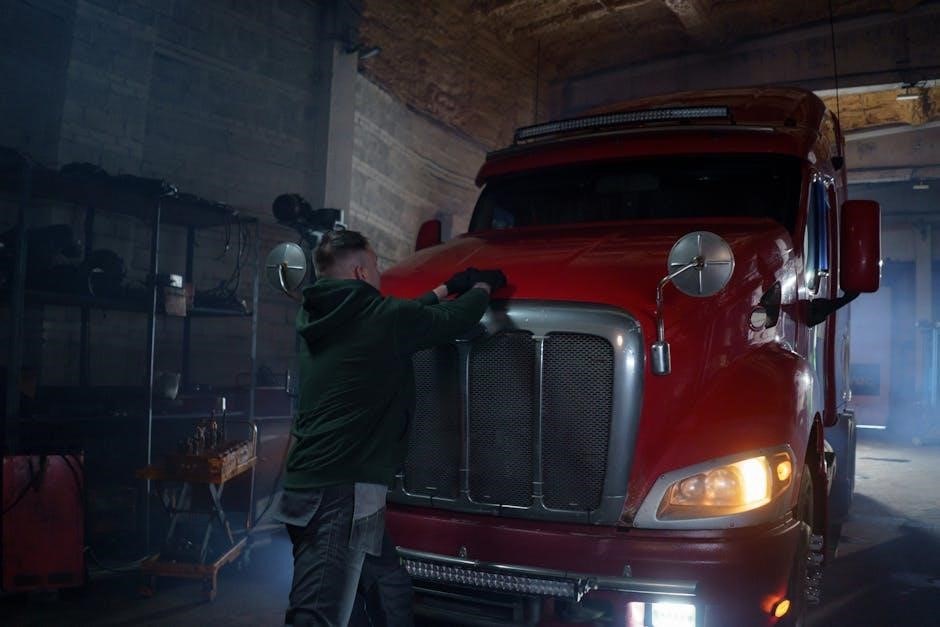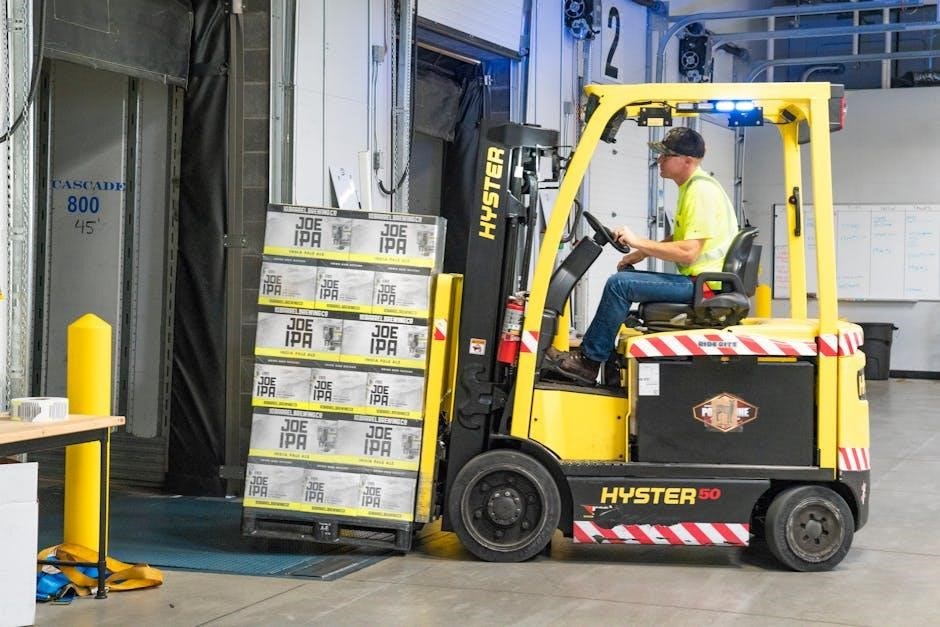new jersey commercial driver license manual
- Published
- in Manuals
The New Jersey Commercial Driver License Manual provides essential information for obtaining a CDL‚ detailing classifications‚ eligibility‚ testing requirements‚ and endorsements. Available on the NJMVC website‚ it’s a vital resource for trucking professionals seeking to comply with state and federal regulations.
1.1 Overview of the Manual
The New Jersey Commercial Driver License Manual is a comprehensive guide detailing rules‚ laws‚ and regulations for CDL holders. It covers essential topics such as safe driving practices‚ traffic laws‚ and specific requirements for commercial vehicles. The manual is structured into chapters‚ each addressing different aspects of commercial driving‚ including vehicle inspection‚ basic control skills‚ and endorsements. Available on the NJMVC website‚ it is accessible in PDF format or as a physical copy. The manual also offers multilingual support and an audio version for easier studying‚ ensuring all applicants can prepare effectively for the CDL exam.
1.2 Importance of the CDL Manual
The New Jersey Commercial Driver License Manual is crucial for ensuring safe and legal operation of commercial vehicles. It provides detailed information on state and federal regulations‚ helping drivers understand their responsibilities. The manual serves as the primary study resource for CDL exams‚ covering essential topics like road safety‚ vehicle inspection‚ and hazardous materials transport. By adhering to its guidelines‚ drivers can reduce risks of accidents and violations. Regular updates ensure compliance with changing laws‚ making it an indispensable tool for both new and experienced CDL holders. It promotes professionalism and accountability in the commercial driving industry.
1.3 Structure of the Manual
The New Jersey Commercial Driver License Manual is organized into clear‚ logical sections to facilitate easy understanding. It begins with an introduction‚ followed by detailed chapters on CDL classifications‚ eligibility requirements‚ and application processes. Subsequent sections cover testing procedures‚ endorsements‚ and restrictions. The manual also includes chapters on maintaining the license and additional resources. Appendices provide quick references for tables‚ diagrams‚ and important contact information. This structured approach ensures that drivers can navigate the material efficiently‚ focusing on specific topics without confusion. The layout is designed to be user-friendly‚ making it easier for drivers to prepare for exams and stay compliant with regulations.

Classification of Commercial Driver Licenses (CDLs) in New Jersey
The New Jersey CDL classification system categorizes licenses into Class A‚ B‚ and C based on vehicle type and weight. This structure helps drivers choose the appropriate license for their career needs.
2.1 Class A CDL
A Class A CDL in New Jersey allows drivers to operate combination vehicles with a trailer weighing over 10‚001 lbs. This includes tractor-trailers and other heavy-duty rigs; To qualify‚ applicants must hold a valid basic driver’s license and pass rigorous skills and knowledge tests. The minimum age is 21‚ and drivers must meet strict medical standards. A Class A CDL is essential for careers in long-haul trucking or heavy freight transport. The manual provides detailed guidance on requirements and testing for this category‚ ensuring drivers are fully prepared for the demands of operating large commercial vehicles safely and efficiently.
2.2 Class B CDL
A Class B CDL in New Jersey is required to operate heavy straight trucks‚ including buses‚ dump trucks‚ and other single-unit vehicles with a Gross Vehicle Weight Rating (GVWR) of 26‚001 pounds or more. This license does not cover combination vehicles like tractor-trailers‚ which fall under Class A. Applicants must be at least 21 years old for interstate driving (intrastate may vary) and pass both knowledge and skills tests. A Class B CDL is ideal for careers in construction‚ public transportation‚ or delivery services‚ offering versatile employment opportunities in various industries.
2.3 Class C CDL
A Class C CDL in New Jersey is designed for operating small passenger vehicles or hazardous materials (HazMat) transport that does not require a Class A or B license. This includes vehicles like small passenger vans and HazMat vehicles requiring a CDL endorsement. The Class C license typically covers vehicles with a Gross Vehicle Weight Rating (GVWR) under 26‚001 pounds but is specifically for transporting 16 or more passengers or hazardous materials. Applicants must meet eligibility criteria‚ including age requirements‚ and pass a knowledge test. A background check is mandatory for HazMat endorsement under federal regulations.
2.4 Endorsements and Restrictions
Endorsements and restrictions on a New Jersey CDL dictate specific operating privileges. Endorsements‚ such as Hazardous Materials (H)‚ Tank Vehicles (N)‚ or Passenger (P)‚ require additional testing and background checks. Restrictions‚ like Air Brake (E) or Automatic Transmission (E)‚ limit driving privileges based on test performance. Drivers must understand these additions to their CDL‚ as they define legal operation parameters. For example‚ a restriction may prohibit operating certain vehicles‚ while an endorsement expands permissible cargo types. Both are critical for compliance and ensuring safe‚ lawful commercial driving practices in New Jersey.

Eligibility Criteria for a New Jersey CDL
To qualify for a New Jersey CDL‚ applicants must meet specific criteria‚ including age‚ residency‚ medical certification‚ and holding a valid basic driver’s license. These requirements ensure safety and compliance with state regulations.
3.1 Age Requirements
In New Jersey‚ applicants for a CDL must be at least 21 years old to operate a commercial vehicle in interstate commerce. For intrastate commerce‚ the minimum age is 18‚ but this applies only within New Jersey borders. Federal regulations require CDL holders to be 21 or older to transport goods or passengers across state lines. Applicants must provide proof of age through a valid birth certificate or passport. The age requirement ensures drivers have sufficient maturity and experience to operate heavy vehicles safely. CDL applicants under 21 are restricted to intrastate operations only until they reach the federal minimum age.
3.2 Residency Requirements
To apply for a CDL in New Jersey‚ applicants must be state residents. This means providing proof of residency‚ such as a utility bill‚ lease agreement‚ or bank statement‚ dated within 60 days. The address on the CDL application must match the residency documents. Non-residents are not eligible for a New Jersey CDL. Applicants must have lived in the state for at least 30 days prior to applying. Residency verification ensures compliance with state and federal regulations. This requirement helps maintain accurate records and prevents fraud. Applicants must meet these criteria to proceed with the CDL application process.
3.3 Medical Certification
All CDL applicants in New Jersey must meet federal medical certification requirements. Drivers must undergo a physical examination by an FMCSA-certified medical examiner to ensure they are fit to operate commercial vehicles. The medical certificate‚ valid for up to two years‚ must be submitted with the CDL application. Applicants with certain medical conditions may require more frequent evaluations. Failure to maintain a valid medical certification can result in CDL disqualification. The medical examiner’s certificate must be carried while driving. This ensures public safety and compliance with federal regulations. Applicants should schedule their exam early to avoid delays in the application process.
3.4 Valid Basic Driver License
To apply for a New Jersey CDL‚ you must hold a valid New Jersey basic driver license. This license must be in good standing‚ with no suspensions or revocations. Applicants must provide proof of identity‚ residency‚ and legal status as part of the process. A valid basic driver license demonstrates that you meet the state’s driving requirements. You will also need to pass vision and knowledge tests before advancing to the CDL application. This step ensures that all CDL applicants have a foundational understanding of driving laws and safety practices. It is a critical preliminary requirement for obtaining a commercial license.

The CDL Application Process
The CDL application process in New Jersey involves submitting an application‚ providing required documents‚ paying fees‚ and obtaining a permit. Applicants must pass knowledge and skills tests.
4.1 Steps to Apply for a CDL
To apply for a CDL in New Jersey‚ visit the MVC website to review eligibility criteria and required documents; Complete the CDL application form online or in person at an MVC office. Submit proof of identity‚ residency‚ and medical certification. Pay the applicable fees for the application and permit. Pass the vision test and knowledge exams for the desired CDL class and endorsements. Upon passing‚ receive a CDL permit‚ which allows you to practice driving under supervision. Schedule and pass the skills test to obtain your full CDL.
4.2 Required Documentation
Applicants must provide specific documents when applying for a New Jersey CDL. These include proof of identity‚ such as a valid U.S. passport or certified birth certificate. Residency verification‚ like a utility bill or lease agreement‚ is also required. A completed Medical Examiner’s Certificate and a valid Social Security card are mandatory. Additional documentation may include a current basic driver license and‚ if applicable‚ proof of military service or immigration status. Ensure all documents are original or certified copies to avoid delays in the application process.
4.3 Fees Associated with CDL Application
The fees for applying for a New Jersey CDL vary based on the license class and endorsements. The CDL application fee is typically $125‚ which includes a $10 permit fee. Additional costs may apply for skills tests‚ endorsements‚ and restrictions. For example‚ the skills test fee is $100‚ and endorsement fees range from $10 to $100‚ depending on the type. Payment can be made using credit cards‚ cash‚ or money orders. Applicants should confirm all fees with the New Jersey Motor Vehicle Commission (MVC) before submitting their application‚ as fees are subject to change.
4.4 Obtaining a CDL Permit
To obtain a CDL permit in New Jersey‚ applicants must meet eligibility criteria‚ including being at least 18 years old and holding a valid New Jersey driver’s license. They must study the CDL manual and pass a vision test‚ as well as knowledge tests for their desired CDL class and any endorsements. Upon passing‚ applicants receive a permit valid for one year. This permit allows practice driving under the supervision of a licensed CDL holder. Applicants should check the New Jersey MVC website for specific requirements and updates before applying for their permit.

CDL Testing Requirements
Applicants must pass a series of tests‚ including knowledge and skills assessments‚ to demonstrate their ability to safely operate commercial vehicles according to New Jersey regulations.
5.1 Knowledge Tests
The knowledge tests assess understanding of commercial driving laws‚ safety practices‚ and vehicle operation. Applicants must pass a general knowledge test and any endorsement-specific tests. Topics include traffic laws‚ road signs‚ vehicle inspection procedures‚ and safe driving techniques. The tests are based on the New Jersey Commercial Driver License Manual. A score of at least 80% is required to pass. Study materials and practice tests are available to help prepare. These tests ensure drivers have the necessary knowledge to operate commercial vehicles safely and responsibly on New Jersey roads. Proper preparation is essential for success.
5.2 Skills Tests
The skills tests evaluate an applicant’s ability to operate a commercial vehicle safely. The test includes three parts: vehicle inspection‚ basic vehicle control‚ and on-road driving. The inspection tests knowledge of safety checks and defect identification. Vehicle control involves maneuvers like backing‚ turning‚ and alley docking. On-road driving assesses traffic navigation‚ adherence to signs‚ and intersection handling; Applicants must score at least 70% to pass. Critical errors‚ such as traffic violations‚ result in automatic failure. These tests ensure applicants can operate commercial vehicles competently and safely. Proper training and practice are essential for success.
5.3 Endorsement-Specific Tests
Endorsement-specific tests are required for drivers seeking specialized privileges. For example‚ the Hazardous Materials (H) endorsement includes a written test on handling dangerous materials. The Tank Vehicles (N) endorsement assesses knowledge of liquid cargo safety. The Double/Triple Trailers (T) endorsement requires demonstrating safe coupling and towing. The Passenger (P) and School Bus (S) endorsements include tests on transporting passengers and pre-trip inspections. These tests ensure drivers are qualified for their specific roles. Additional fees and requirements may apply. Proper preparation is crucial to pass these specialized assessments.

Endorsements for a New Jersey CDL
Endorsements allow CDL holders to operate specialized vehicles or transport specific cargo. Examples include hazardous materials‚ tank vehicles‚ and double/triple trailers. Each requires additional tests and documentation.
6.1 Hazardous Materials (H) Endorsement
The Hazardous Materials (H) Endorsement allows drivers to transport hazardous materials. It requires a written test covering safe handling‚ regulations‚ and emergency procedures. Applicants must undergo a federal background check by the Transportation Security Administration (TSA) and provide proof of U.S. citizenship or lawful permanent residency. A valid CDL permit is also necessary to apply. The endorsement is critical for drivers in industries like chemical transport and waste management. Proper documentation and adherence to safety protocols are strictly enforced to ensure public safety and regulatory compliance.
6.2 Tank Vehicles (N) Endorsement
The Tank Vehicles (N) Endorsement is required for drivers operating vehicles designed to transport liquids or gases in bulk. To obtain this endorsement‚ applicants must pass a written test covering safety measures‚ loading procedures‚ and emergency response. The endorsement is essential for drivers of tank trucks or trailers. Proper training and knowledge of handling pressurized or liquid cargo are critical to ensure safety on the road. This endorsement demonstrates competency in managing the unique challenges of tank vehicle operations‚ including cargo securement and leakage prevention.
6.3 Double/Triple Trailers (T) Endorsement

The Double/Triple Trailers (T) Endorsement is required for drivers operating a combination vehicle with two or more trailers. To obtain this endorsement‚ applicants must pass a written test covering topics such as coupling and uncoupling‚ trailer maneuvering‚ and safety practices for longer vehicles. This endorsement is essential for drivers who need to handle the unique challenges of operating double or triple trailers‚ including increased stopping distances and reduced maneuverability. It demonstrates the ability to safely manage complex trailer configurations‚ ensuring compliance with New Jersey CDL regulations. The endorsement is not required for all CDL holders‚ only those specifically operating these vehicles.
6.4 Passenger (P) Endorsement
The Passenger (P) Endorsement is required for drivers operating vehicles designed to transport 16 or more passengers‚ including the driver. This endorsement is essential for bus drivers‚ limousine drivers‚ and other professionals responsible for safely transporting groups of people. To obtain the P Endorsement‚ applicants must pass a written test and a skills test. The endorsement ensures drivers understand specific safety regulations and passenger management techniques. It is a critical requirement for anyone seeking to drive passenger-carrying commercial vehicles in New Jersey‚ ensuring the safety and well-being of all passengers during transit.
6.5 School Bus (S) Endorsement
The School Bus (S) Endorsement is required for drivers operating vehicles used to transport pre-primary‚ primary‚ or secondary school students. This endorsement ensures drivers are trained to safely manage school buses and handle emergencies. To obtain the S Endorsement‚ applicants must pass a written test‚ a skills test‚ and a background check. The endorsement emphasizes safety protocols‚ student behavior management‚ and adherence to traffic laws. It is mandatory for all school bus drivers in New Jersey‚ reflecting the state’s commitment to safeguarding children during transportation. The endorsement is renewed periodically to maintain high safety standards.

Restrictions on a New Jersey CDL
CDL restrictions in New Jersey ensure safe operation of commercial vehicles. Common restrictions include air brake‚ automatic transmission‚ and tractor-trailer limitations. These restrictions are based on driver qualifications and vehicle type.
They are clearly indicated on the CDL to prevent unauthorized operations. Drivers must understand and comply with these restrictions to maintain their licensing privileges and road safety.
7.1 Air Brake Restriction
The Air Brake Restriction (L Restriction) applies to CDL holders who are not qualified to operate vehicles with air brakes. This restriction is imposed if the driver’s skills test was conducted in a vehicle without air brakes. Drivers with this restriction are prohibited from operating commercial vehicles equipped with air brake systems. To remove the restriction‚ drivers must pass a skills test in a vehicle with air brakes. This ensures safe operation of air-braked vehicles‚ as improper use can lead to accidents. The restriction is clearly noted on the CDL to avoid violations and maintain road safety standards in New Jersey.
7;2 Automatic Transmission Restriction
The Automatic Transmission Restriction‚ denoted by the letter “E” on a CDL‚ limits drivers to operating vehicles with automatic transmissions only. This restriction is placed if the driver takes the skills test in a vehicle equipped with an automatic transmission. Drivers with this restriction are prohibited from operating vehicles with manual transmissions. This ensures that drivers only operate vehicles for which they have been properly trained and tested. To remove this restriction‚ drivers must pass a skills test in a vehicle with a manual transmission. This rule helps maintain safety and compliance with federal regulations.
7.3 Tractor-Trailer Restriction
The Tractor-Trailer Restriction‚ often denoted by the letter “E” on a CDL‚ prohibits drivers from operating a tractor-trailer combination. This restriction typically applies to Class A CDL holders who fail the pre-trip inspection or the skills test involving a tractor-trailer. Drivers with this restriction are limited to operating smaller commercial vehicles‚ such as those classified under Class B or Class C CDLs. This restriction can impact job opportunities‚ as many commercial driving roles require the ability to handle tractor-trailers. Removing the restriction requires retaking and passing the skills test with a tractor-trailer combination.

Maintaining Your New Jersey CDL
Maintaining your New Jersey CDL requires regular renewal‚ updated medical certification‚ and compliance with state and federal regulations to ensure continuous eligibility and driving privileges.
8.1 Renewal Process
To renew a New Jersey CDL‚ drivers must submit their application before the expiration date. The renewal process typically begins 120 days prior to the license expiration. Applicants can renew online‚ in person at an MVC office‚ or by mail. Required documents include a completed application form‚ proof of identity‚ residency‚ and medical certification. Fees vary based on the license class and endorsement updates. Drivers must pass a vision test and update their medical certification if applicable. The MVC will issue a renewed CDL upon successful completion of the process. Regular renewal ensures compliance with state and federal regulations.
8.2 Disqualifications and Suspensions
A New Jersey CDL can be disqualified or suspended due to severe traffic violations‚ safety violations‚ or other offenses. Disqualification periods vary based on the severity of the offense‚ ranging from 60 days to lifetime disqualification for serious violations. Common causes include reckless driving‚ driving under the influence‚ and leaving the scene of an accident. Drivers may also face suspension if they accumulate too many points on their record or fail to comply with medical certification requirements. The New Jersey MVC notifies drivers in writing‚ outlining the reason and duration of the disqualification or suspension. Reinstatement may require completing specific steps‚ such as paying fees or retaking tests.
8.3 Medical Certification Updates
CDL holders in New Jersey must maintain valid medical certification to ensure public safety. The Federal Motor Carrier Safety Administration (FMCSA) requires drivers to submit a Medical Examiner’s Certificate periodically. The certification must be updated every 1-2 years‚ depending on the driver’s health conditions. Failure to update medical certification by the deadline may result in the CDL being downgraded or suspended. Drivers can check their certification status and submit updated forms through the New Jersey Motor Vehicle Commission (NJMVC). Keeping medical certification current is essential to maintain CDL privileges and comply with federal and state regulations.

Additional Resources
The New Jersey MVC website offers comprehensive study materials‚ including the CDL manual and practice tests. Office locations and contact details are also provided for assistance.
9.1 Study Materials and Practice Tests
The New Jersey Commercial Driver License Manual is the primary study resource for CDL applicants. It covers essential topics like vehicle inspection‚ traffic laws‚ and safe driving practices. Additionally‚ the New Jersey MVC website offers online practice tests that simulate the actual knowledge exams. These tests help applicants assess their readiness and identify areas for improvement. Third-party websites also provide practice tests and study guides tailored to New Jersey CDL requirements. Utilizing these materials ensures applicants are well-prepared for the knowledge and skills tests required to obtain their CDL. Consistent study and practice are key to success.
9.2 New Jersey MVC Office Locations
The New Jersey Motor Vehicle Commission (MVC) operates multiple offices statewide to assist with CDL applications and related services. Key locations include Trenton‚ Newark‚ Jersey City‚ Camden‚ and Paterson. These offices provide convenient access for applicants to submit paperwork‚ take tests‚ and complete other CDL requirements. For a comprehensive list of MVC offices‚ visit the official New Jersey MVC website or contact their customer service at (609) 292-6500. This resource ensures applicants can find the nearest location to streamline their CDL process efficiently.
- Trenton MVC Agency
- Newark MVC Agency
- Jersey City MVC Agency
- Camden MVC Agency
- Paterson MVC Agency
9.3 Contact Information for Assistance
For questions or assistance regarding the New Jersey Commercial Driver License Manual or the CDL process‚ contact the New Jersey Motor Vehicle Commission (NJ MVC). The NJ MVC can be reached by calling their customer service at (609) 292-6500 or visiting their official website at www.njmvc.gov. Additionally‚ you can email them at customer.service@njmvc.gov for general inquiries or scheduling appointments. For in-person assistance‚ visit one of the NJ MVC office locations statewide.
